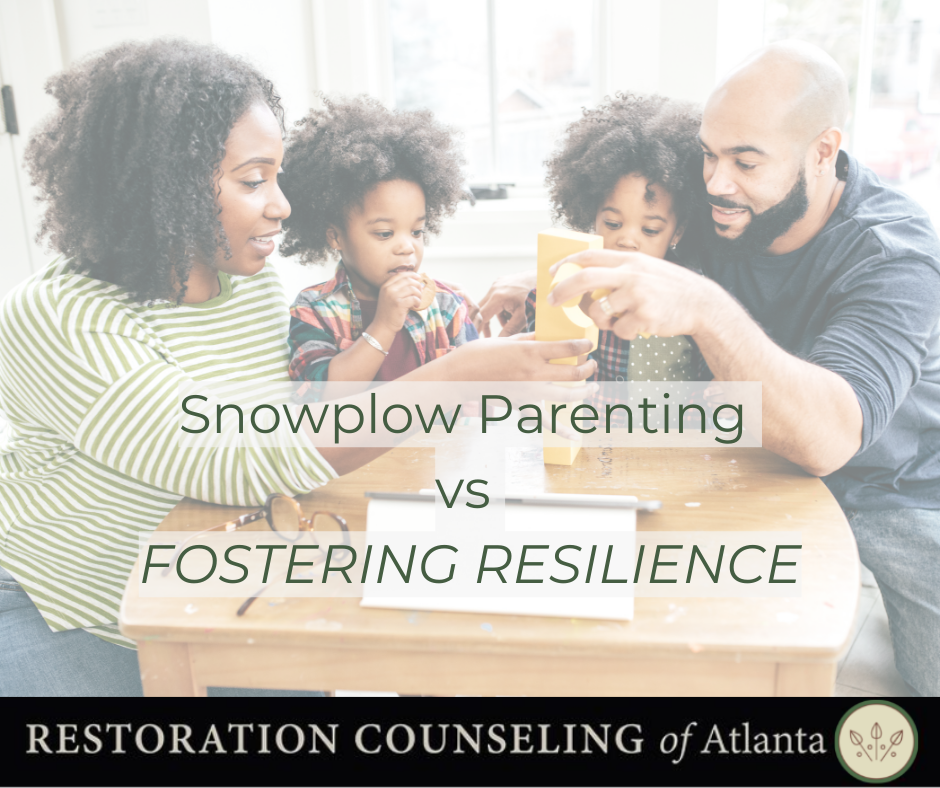What is Snowplow Parenting?
Snowplow parenting seeks to remove obstacles facing a child to spare them from failure, distress, or pain. In this metaphor, the parent is the snowplow, actively smoothing the way of the child so they are spared difficulty and any barriers to success are removed.
It is very tempting for well-meaning parents to succumb to the temptation to “snowplow” for their children. Loving parents naturally desire to give their children a successful and low-stress life.
The Result
As the popularity of this parenting style has increased, our culture has seen a decrease in resourcefulness, adaptability, and resilience when compared to previous generations. Instead of producing a generation of more successful, confident, and resilient individuals, snowplow parenting has burdened our children with crippling baggage.
Snowplowing deprives a child of the opportunity to solve problems for themselves. Oftentimes, parents are trying to make their children’s childhoods better than they experienced themselves. This is a natural drive; however, parents often fail to acknowledge how their personal difficulties contributed to their positive qualities. When we remove all obstacles, we deny our children the opportunity to grow through adaptation.
A Recollection of Resilience Development
Remember a time when you were young, and something piqued your curiosity? Perhaps you decided to see what would happen if you piled blocks very high. At some point, you would stack them in such a way, or to such a height, that they would fall over.
The curiosity and excitement you were feeling have now changed. Your work is undone, and your goals thwarted. This may have left you feeling disappointed, frustrated, frightened, or maybe sad. This is emotional shift number 1.
You now face a challenge. Should I rebuild or should I quit? If I rebuild, what should I do differently? At this point, you may dig deep and find that glimmers of hope and curiosity remain. You grasp hold of these and begin stacking the blocks anew. This is emotional shift number 2. You moved past your negative feelings and focused on the remaining positive drive. Your motivation to endure was a spark in your negative emotional moment, but it is now a flame which will be stoked and fed.
If this scenario happened in your childhood, hopefully, you continued this cycle until you learned successfully to stack the blocks in a way that pleased you. You likely beamed with a sense of self-sufficiency and amazement at your accomplishment. Perhaps you felt surprised at your improvement and contented with the overall process. This is the final emotional shift. Your emotional state transitioned from frustration, to hopelessness, to contentment. Furthermore, you experienced that a range of emotions is acceptable and not overwhelming. You developed resilience!
This is a simplified example of how resilience is developed. Children must face obstacles. When they face them, they must experience these emotional shifts and grab hold of inner resources that propel them onward. A parent cannot experience this on a child’s behalf. The child must experience it for themselves.
The Crippling Emotional Consequences of Snowplow Parenting
Constantly removing obstacles for a child stunts the development of emotional awareness. It is critical that the child be permitted to face the obstacle and related emotions and find they can persevere with the task in the presence of these emotions.
If parents attempt to circumvent this experience, the child learns many stifling messages. One negative message that can be inadvertently communicated is that failure is unacceptable. If a child believes that failure is unacceptable, the child will eventually quit trying. Parents who desire to spare their child from failure end up teaching the child that failure is too scary and, therefore, not worth the risk.
Another message communicated by snowplow parenting is that negative emotions are to be avoided and hidden. Instead of a healthy acknowledgment of frustration, followed by a choice to persevere, the frustration may be denied, and the source of the frustration abandoned. This teaches that avoidance is the way to deal with emotions, rather than ownership and understanding. This is a harmful message to healthy emotional growth.
Lastly, parents who snowplow communicate inadvertently that they believe their child is incapable. This undermines the positive development of the child’s self-efficacy. Self-efficacy is the deep belief that we are capable of acting. We can do things! In order to act confidently, everyone needs a measure of self-efficacy. When assistance is offered too often, the child may become afraid to do things independently and become overly dependent on others.
These messages can contribute to an apathetic, fearful, and passive character.
How to Stop Snowplow Parenting
- Let your child face natural consequences whenever possible.
- Allow your child to struggle with a healthy amount of frustration.
- Praise good effort, not success alone.
- Encourage children to help themselves instead of waiting on others.
- Acknowledge failure and adversity as a necessary part of life.
- Participate in making creative meaning out of adversity.
- Let your primary goal be building resilience and character instead of task acquisition.
If these tips have helped you build resilience in your parenting and avoid snowplowing for your children, I would love to help you more! Please contact me at Restoration Counseling Atlanta. I work from the Buckhead, Woodstock, and Roswell offices, and online.
 Written by: Nancy Messner
Written by: Nancy Messner
nancy@restorationcounselingatl.com
678-534-3824, ext.130
Nancy has a passion for working with individuals and families as they strive to face life’s challenges. She has been married for 27 years to a pastor and they have five children together (ages 11-22). She offers an objective, understanding, and non-judgmental atmosphere where individuals and families can work on healing and growing under the light of God’s truth. Nancy received her training from Wheaton College in 1999 and has lived in Atlanta for 10 years.

